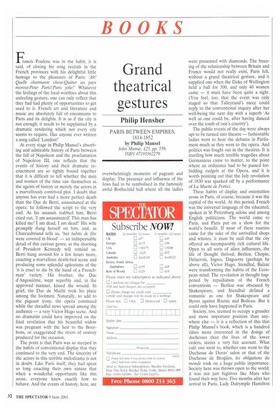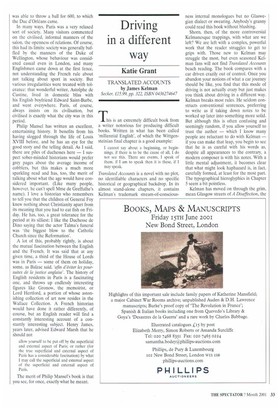Grand theatrical gestures
Philip Hensher
PARIS BETWEEN EMPIRES, 1814-1852 by Philip Mansel John Murray, ,f25, pp. 559, ISBN 07195562279 Francis Poulenc was in the habit, it is said, of closing his song recitals in the French provinces with his delightful little homage to the pleasures of Paris: Ah! Quelle charmante chose/Quitter un pays morose/Pour Paris! !Paris jolier Whatever the feelings of the local worthies about this unfeeling gesture, one can only reflect that they had had plenty of opportunities to get used to it. French art and literature and music are absolutely full of encomiums to Paris and its delights. It is as if the city is not enough; it needs to be supplanted by a dramatic rendering which not every city seems to require. Has anyone ever written a song called 'London!'
At every stage in Philip Mansel's absorbing and admirable history of Paris between the fall of Napoleon and the proclamation of Napoleon III, one reflects that the events of history and their dramatic reenactment are so tightly bound together that it is difficult to tell whether the men and women of the time saw themselves as the agents of history or merely the actors in a marvellously contrived plot. I doubt that anyone has ever had a more perfect death than the Due de Bern, assassinated at the opera: he followed the script to the very end. As his assassin stabbed him, Berri cried out, 'I am assassinated! This man has killed me! I am dead, I am dead!' His wife promptly flung herself on him, and, as Chateaubriand tells us, 'her habits de fete were covered in blood' — an indispensable detail of this curious genre, as the shooting of President Kennedy will remind us. Berri hung around for a few hours more, enacting a marvellous death-bed scene and producing some splendid aphorisms of the 'it is cruel to die by the hand of a Frenchman' variety. His brother, the Due d'Angouleme, wept superbly and, in the approved manner, kissed the wound. In grief, the Due de Maine' took his place among the footmen. Naturally, to add to the piquant irony, the opera continued while the dreadful news spread among the audience — a very Victor Hugo scene. And no dramatist could have improved on the final revelation that his beautiful widow was pregnant with the heir to the Bourbons, or exaggerated the rivers of oratory produced for the occasion.
The point is that Paris was so steeped in the habits of conventional display that they continued to the very end. The sincerity of the actors in this terrible melodrama is not in doubt. Like Paris itself, they had spent so long enacting their own nature that when a wonderful opportunity like this arose, everyone knew exactly how to behave. And the events of history, here, are overwhelmingly moments of pageant and display. The presence and influence of the Jews had to be symbolised in the famously awful Rothschild ball where all the ladies were presented with diamonds. The freezing of the relationship between Britain and France would not really exist, Paris felt, without a grand theatrical gesture, and it supplied one when the Duke of Wellington held a ball for 500, and only 40 women came — it must have been quite a sight. (You feel, too, that the event was only staged so that Talleyrand's niece could reply to the conventional inquiry after her well-being the next day with a superb As well as one could be, after having danced over the tomb of one's country').
The public events of the day were always apt to be turned into theatre — fashionable ladies went to hear the debates in Parliament much as they went to the opera. And politics was fought out in the theatres. It is startling how much terrible tragedies about Germanicus came to matter, to the point where an ordinance had to be passed forbidding cudgels at the Opera, and it is worth pointing out that the July revolution of 1830 was sparked off by a performance of La Muette de Portici.
These habits of display and ostentation arose in Paris, of course, because it was the capital of the world. At this period, French was the universal language of the educated, spoken in St Petersburg salons and among English politicians. The world came to Paris, and Paris put on a show for the world's benefit. If most of these tourists came for the sake of the unrivalled shops and whores, it must be said that the city offered an incomparably rich cultural life. Open to all sorts of alien influences, the life of thought thrived; Berlioz, Chopin, Delacroix, Ingres, Daguerre (perhaps he above all), Victor Hugo, Stendhal, Balzac were transforming the habits of the European mind. The revolution in thought happened by repudiation of the French conventions — Berlioz was obsessed by Shakespeare, and Stendhal defined a romantic as one for •Shakespeare and Byron against Racine and Boileau. But it could only have happened in Paris.
Society, too, seemed to occupy a grander and more important position than anywhere else — it is a reflection of this that Philip Mansel's book, which is a hundred times more interested in the doings of duchesses than the lives of the lower orders, seems a very fair account. What café one went to, whether one went to the Duchesse de Duras' salon or that of the Duchesse de Broglies, les obligations du rnonde took on a huge public importance. Society here was thrown open to the world; it was not just fugitives like Marx who found their way here. Five months after her arrival in Paris, Lady Dalrymple Hamilton was able to throw a ball for 600, to which the Duc d'Orleans came.
In many ways, Paris was a very relaxed sort of society. Many visitors commented on the civilised, informal manners of the salon, the openness of relations. Of course, this had its limits: society was generally baffled by the manners of the Duke of Wellington, whose behaviour was considered casual even in London, and many Englishmen came down at the first fence, not understanding the French rule about not talking about sport in society. But various irregularities were treated with tolerance: that wonderful writer, Astolphe de Custine, lived in domestic bliss with his English boyfriend Edward Saint-Barbe. and went everywhere. Paris, of course, always insists on its civilisation, but civilised is exactly what the city was in this period.
Philip Mansel has written an excellent, entertaining history. It benefits from his having slogged through the life of Louis XVIII before, and he has an eye for the good story and the telling detail. As I said, there are piles of duchesses here — I suspect sober-minded historians would prefer grey pages about the average income of cobblers, but this makes a much more sparkling read and has, too, the merit of talking about what the age would have considered important. (Like many people, however, he can't spell Mme de Greffulhe's name). I love a historian who remembers to tell you that the children of General Foy knew nothing about Christianity apart from its meaning that you had to eat fish on Friday. He has, too, a great tolerance for the period at its silliest: I like the Duchesse de Dino saying that the actor Talma's funeral was the biggest blow to the Catholic Church since the Reformation'.
A lot of this, probably rightly, is about the mutual fascination between the English and the French. It was said that at any given time, a third of the House of Lords was in Paris — some of them on holiday, some, as Balzac said, `afin d'eviter les poursuites de in justice anglaise'. The history of English residents in Paris is a fascinating one, and throws up endlessly interesting figures like Gronow, the memoirist, or Lord Hertford, a portion of whose astonishing collection of art now resides in the Wallace Collection. A French historian would have done it rather differently, of course, but an English reader will find a constantly interesting account of a constantly interesting subject. Henry James, years later, advised Edward Marsh that he should not
allow yourself to be put off by the superficial and external aspect of Paris; or rather (for the true superficial and external aspect of Paris has a considerable fascination) by what I may call the superficial and external aspect of the superficial and external aspect of Paris.
The merit of Philip Mansel's book is that you see, for once, exactly what he meant.



































































 Previous page
Previous page